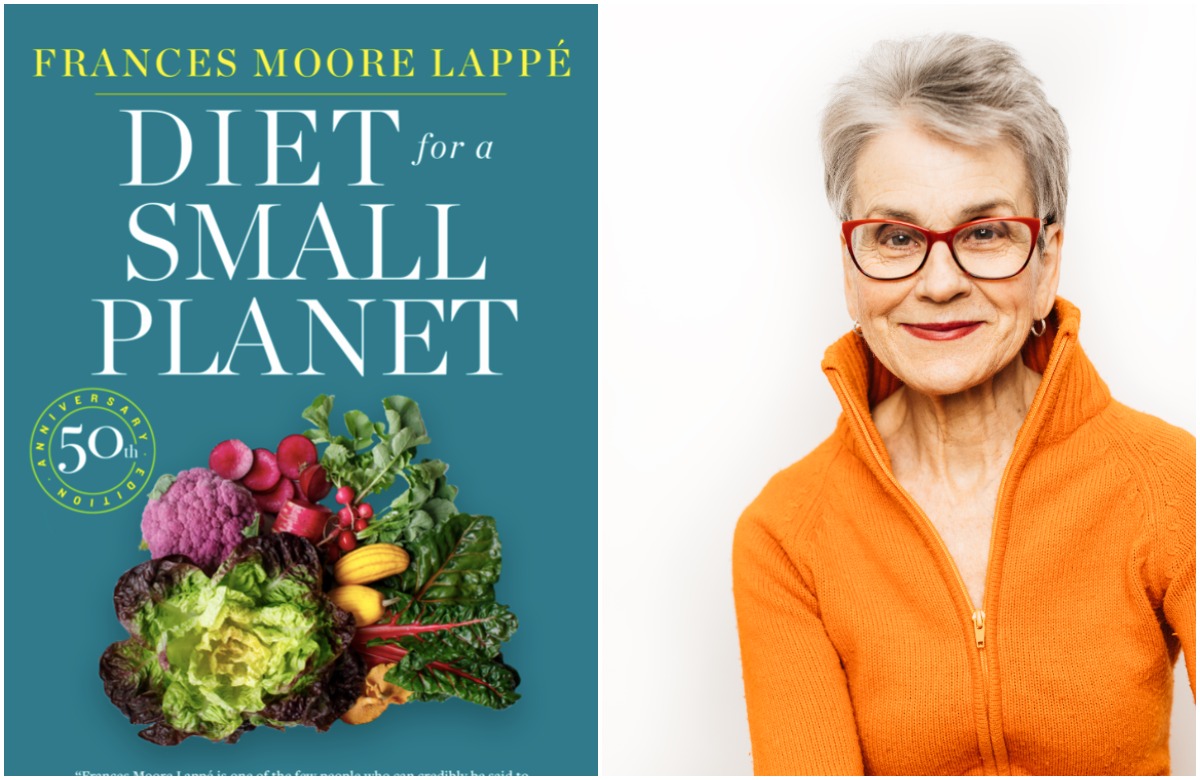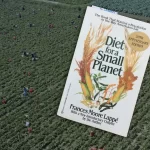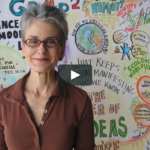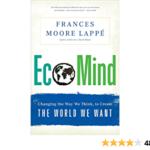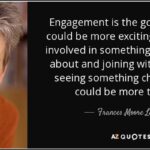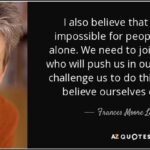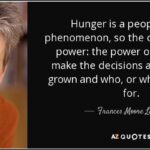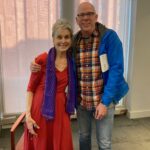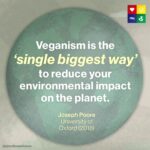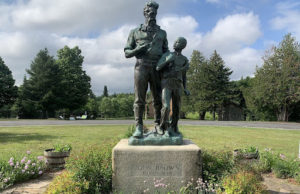A few weeks ago, I had the great pleasure of meeting legendary author Frances Moore Lappe. Ms. Lappe has published more than 20 books on food, world hunger, “living democracy”, and the environment. I attended a discussion that was being held at New York University (NYU), celebrating the 50th anniversary of Ms. Lappe’s groundbreaking work, Diet for a Small Planet (which has now sold over 3.5 million copies!). A self described hopemonger (I love that), and planetarian, Ms. Lappe is a vegetarian whose books helped make people aware that eating less meat was better for our health, and our planet. What makes her work so significant, is that she was researching and talking about this stuff over 50 years ago! Wow.
I have learned from her work how billionaires dictate policy in the United States, as well as how the US ranks a “sad” 59th in the world, with regards to the quality of its democracy (political rights and civil liberties). Ms. Lappe also helped coin the phrase “Living Democracy”. She had this to say when asked about her interest in democracy: “Well, after, really, most of my adult life, two decades focused on why hunger in a world of plenty, I came to see that the cause of hunger is not a scarcity of food, not a scarcity of resources at all, of course; it is a scarcity of democracy. So, the key question that’s guiding my life, then, is: How do we create, how do we participate in shaping, a form of democracy that engages people, that is strong and inclusive enough to really eradicate hunger and end, of course, many other social, environment ills that are worsening? So, for me, there was a very logical step from asking why hunger to peeling away the questions to the fundamental question of: How do we create a democracy that works?”
“A small number of people in every generation are forerunners, in thought, action, spirit, who swerve past the barriers of greed and power to hold a torch high for the rest of us. Lappé is one of those.” – Howard Zinn
Although I was disappointed to learn that Frances Moore Lappe is not completely vegan, I have to say that she was a true delight. Personable, smart, engaging, and gracious, she was definitely the highlight of the afternoon. She is an icon for good reason! The discussion lasted for nearly 1.5 hours before the Q&A started. Since nobody flinched when asked if there were any questions from the audience, I stood up, and shared my two cents.
Me (1:27:36 on link below): Hello. It’s an honor to be able to hear this talk. Thank you so much for doing this, everyone. Howard Lyman once said that “You can’t call yourself an environmentalist and eat meat. Period.” I am an anti-war activist, peace activist, and I was down in Washington, DC, about a month ago, March 18th, for the twentieth anniversary of the illegal invasion and occupation of Iraq by the United States Government. I kind of thought about his words when I was done and my fellow marchers, when so many of them, I noticed, sat down to have a cheeseburger or some fried chicken. So, I started thinking, you know, I don’t think you can call yourself a peace activist, and eat animal products. I was struck by, and I’ve seen this pattern many times, I’m struck by how many people there are who you know can be so brilliant, and compassionate, in some areas, yet so disconnected in other ways, and in other areas. So, I would love to hear your thoughts on why you think that is. Thank you.
Frances Moore Lappe (1:28:35): I would go back to my comment about our social nature is this: Can you hear me? I would go back to my observations about, we are social creatures, and we, you know that it’s very hard to break from our pack. And I think that what is difficult for people is to rethink something so basic. If their social life is around the Hamburger, you know, if there, if if their friends are with this at all, I think that makes it very difficult. And so, I don’t know if i’m particularly good at it. But I think really welcoming people in, Hey, this really tastes good, what if you just tried, rather than you know it’s bad that you are contributing to this needless waste. It’s a suffering of animals, etc., that Oh, there’s another way of being that actually you feel better, and and it has all these positive ripples throughout our environment. And, but I do think the the challenge is that we so depend on the approval of our closest friends and family, and so to break from that is very difficult. So I think again the invitation. The approach of invitation, rather than scold, is one way that I think has worked in my life, you know, and i’d love to hear your ideas as well on such an important question.
Marion Nestle (Marion Nestle is a molecular biologist, nutritionist, and public health advocate. She is a Professor of Nutrition, Food Studies, and Public Health at New York University, 1:30:14): Yeah. I think animals have a place in the diet, and the question is how to have them have a smaller place. Most of the dietary recommendations that are coming from big international bodies now are suggesting that in developed countries like ours we should reduce our meat consumption by half, and increase our vegetable consumption by another, but double double the vegetables, half the meat. And so the question is, how do you reduce the overall level of meat intake. Certainly some of the healthiest diets in the world, are diets, like the classic Asian poverty diets that were grains, rice, and other kinds of grains with small amounts of meat in them. Umm, nobody ever thought that we would be raising them in CAFOs, Confined Animal Feeding Operations and chickens in batteries, and it’s that kind of industrial production that really has to stop but small amounts of meat, they make people healthier.
Frances Moore Lappe (1:31:24): And you might remember, in my remarks I mentioned this study, so that if we just move to a Mediterranean diet, that that would be the greenhouse gas equivalent of taking all the traffic and ships and planes away, so that that is huge. That is huge from an environmental point of view.
Marion Nestle (later in the discussion, 1:46:36): “So where does that leave small dairy farms, in a very, very bad position, because they don’t have economies of scale. and we, as a society, need to decide if we want to have small dairy farmers, groups who don’t eat any animal products, don’t care at all about dairy farmers. People like me, who like cheese and ice cream (changes her vocal tone to baby talk). I’m sorry, but I do (crowd giggles), think that small dairies that are run on an ecological system, where they’re doing regenerative farming and putting back into the soil what they’re taking out, and grazing their cows on grass, that that’s a completely reasonable way to to to raise dairy, but not when they’re are thousands and thousands of cows locked in a barn.”
Marion Nestle appears to be a classic example of the type of person that my question references: How can someone be so smart and compassionate in some areas, yet so completely wrong and disconnected in other ways, and in other areas? She made a few statements that are simply not true, and she also insulted vegans by claiming that “people who don’t eat animal products, don’t care at all about dairy farmers.” I had the feeling that Ms. Nestle has complete disdain for animal rights activists.
Okay, so there is a lot to unpack from Marion Nestle’s comments (btw, nobody challenged her due in part, I suspect, to their love of hearing good things about their bad habits). Although I was shaking my head in disagreement with many of Ms. Nestle’s comments, I kept my mouth shut out of respect to Ms. Lappe. In addition, I also know that Marion Nestle has done excellent work, and is probably an otherwise nice person.
Marion Nestle’s Untruths (false statements, distortions, and whoppers):
1. “I think animals have a place in the diet, and the question is how to have them have a smaller place. Most of the dietary recommendations that are coming from big international bodies now are suggesting that in developed countries like ours we should reduce our meat consumption by half, and increase our vegetable consumption by another, but double double the vegetables, half the meat…but small amounts of meat, they make people healthier.” – Professor Marion Nestle
– Dr. T. Colin Campbell, the world renowned biochemist, has said that “the closer you are to a plant-based diet, the greater the health benefit.” Mic drop. One of the many concepts that I learned from Dr. Campbell is that whole plant-based foods are health promoting, whereas animal products and processed foods are health harming. If someone still insists on eating health harming animal products, it is best that they try to keep the amount they consume to less than 5% of their total caloric intake. Unfortunately, most people who eat the Standard American Diet (SAD), are getting about 30% of their calories from animal products, and 60% from processed foods, which is why so many Americans are sick. Ms. Nestle seems to be suggesting that eating animal products is like cigarette smoking, and that all you need to do is cut back and you will be fine. This might be true in some cases, but how many people can stop at just one cigarette a day? And more importantly, how many people will view her reckless comments as a license to keep eating more animal products? My guess is that, like many people, she doesn’t want to consider the misery on her own plate, so she makes up these types of statements in order to feel better about her own choices. Perhaps there are other factors too regarding politics, and the funding for NYU programs. Lastly, she doesn’t provide the studies of the “big international bodies” to support her claims (I reached out to NYU’s Department of Food and Nutrition Studies multiple times, and nobody returned my calls or emails). The bottom line? The data showing the health benefits for plant-based diets is overwhelming. There is also a growing international consensus that plant-based diets are health promoting, and animal based diets are conversely, health harming. In fact, I am not aware of one single “Non-Big Ag” funded study, that shows that eating animal products is, overall, beneficial to human health.
Click here to learn more about the power of plant-based nutrition.
– Except for people living in extreme conditions in remote parts of the world, animals, absolutely, do not have a place in our diet. Human beings are not designed to eat animal products, and nobody can explain the science better than Dr. Miltion Mills.
Click here for the superb presentation from Dr. Milton Mills titled, “Are humans designed to eat meat?”
Click here to learn more from the legendary Dr. T. Colin Campbell.
Click here to learn more from Dr. Brooke Goldner on whether humans need meat in their diets.
2. “Groups who don’t eat any animal products, don’t care at all about dairy farmers. People like me, who like cheese and ice cream (changes her vocal tone to baby talk). I’m sorry, but I do (crowd giggles)…” – Professor Marion Nestle
– I don’t know where to begin here, and still keep it short. Ms. Nestle’s comments are both disappointing and offensive, and even make me question her integrity. Has she not seen the heartbreaking documentaries Earthlings, and Dominion, as well as the short video, Dairy is Scary? Has she also not heard of the inspiring “Trans-farmation Project” (Mercy for Animals), that helps people who are looking for a way out of animal farming, learn sustainable plant production, and then connect with businesses that need their products? She clearly must also know that dairy is liquid meat, and that over 95% of the dairy that people consume comes from animal factories, where the misery and suffering of animals is unimaginable. Talk about being disconnected, and pandering to the crowd (a crowd that probably looks up to her too). Dairy products are one of the most damaging, and least healthiest food options on the planet. 🙁
Click here to learn from PCRM (Physicians Committee for Responsible Medicine) on the health risks of dairy products.
Click here to learn more about the health destroying impact of dairy products from Dr. Michael Greger, via NutritionFacts.org.
Click here to learn more about The Transfarmation Project from Mercy for Animals (vegans care about people too).
Click here to learn more about the devastating impact of the dairy industry on the environment.
3. “People like me…think that small dairies that are run on an ecological system, where they’re doing regenerative farming and putting back into the soil what they’re taking out, and grazing their cows on grass, that that’s a completely reasonable way to to to raise dairy, but not when they’re are thousands and thousands of cows locked in a barn.” – Professor Marion Nestle
– Again, some of Ms. Nestle’s statements are simply not true. I reached out to Mohan Gurunathan for clarification on the myth that regenerative farming, and grass raised cattle, are sustainable, and good for the planet. He was kind enough to share the following information:
“The idea of “Regenerative Grazing” is a flawed concept being promoted aggressively by ranchers and the beef cattle industry. They are trying to re-frame one of the most environmentally destructive industries — cattle grazing — as a climate saviour. There is scant scientific evidence that any form of grazing offers any climate benefit whatsoever, and there are many studies that show methane emissions are actually much higher from grass-fed cattle. The studies claiming a positive effect from “regenerative grazing” are largely funded by the beef industry or anecdotal accounts from ranchers themselves – presenting an inherent conflict of interest. These studies are full of holes and misinterpreted data…They say that cattle trampling improves the soil; in fact, the opposite is true. Cattle trampling compacts the soil and makes it harder for water and nutrients to enter. They say that cattle manure helps plants regenerate, but most cattle manure runs off into waterways and pollutes our rivers and groundwater….Ranchers systematically kill any wildlife that threaten their bottom line. We currently have nearly 100 MILLION cows roaming across 20% of the land mass of North America, and populations of wild animals (wolves, bears, deer, elk, coyote bison) are nowhere close to this. These wild animals have been decimated by the ranching industry, who blames wildlife on the deteriorating condition of our grasslands, when it is the cattle that are responsible. Would you rather have 100 million cattle – an introduced, non-native and destructive species – or a rich natural ecosystem full of wolves, bear, coyote, elk, and thousands of other native species? You can’t have both. Bottom line – please don’t believe the hype about “regenerative grazing,” it is a gross myth promoted by the cattle industry.” – Mohan Gurunathan
*Learn More:
Click here to learn more from Oxford University’s “Grazed and Confused” study.
Click here to learn more from the World Resources Institute.
Click here to learn more from the Sierra Club.
Click here to learn more from Mohan Gurunathan.
The Frances Moore Lappe/Climate Change event was held by NYU’s Department of Nutrition and Food Studies, and also included Professor of Food Studies, Amy Bentley, and Associate Professor of Environmental Studies, David Kanter. I appreciated that the celebration was free, and that everyone was pleasant. However, it was disturbing to know that the event was part of NYU’s 2040 Now, “a University-wide sustainability initiative providing a range of forums, including community challenges, events, exhibitions, and competitions, to explore NYU’s community response to the challenge of climate change.”
Nobody spoke up, or pushed back against the many false statements that were made by Professor Nestle. I am sure that there are a ton of reasons for that, but a lively discussion was not meant to be. Nobody on the panel, or in the audience, seemed to have read The China Study, or was familiar with the research that is being done all over the world implicating Animal Agriculture (and the dairy industry), as the biggest contributor to the climate crisis. Everyone smiled, and pretended that the Emperor was wearing clothes. I know that I should be more politically correct, but it is just that there are a lot of young people who probably look up to these academic folks, and believe every word that they say. Does the NYU faculty know that according to Oxford University, the single biggest thing that anyone can do to fight the climate crisis, is adopt a vegan diet? Why was NYU serving 4-5 different dairy cheeses for this climate change event? A name plate for their “refreshments”, said “Domestic and Local Cheese”, and I was told that it was indeed dairy cheese. And again, this gathering was part of a sustainability initiative that was put together by the NYU community to respond to the challenges of climate change. I mean, they even called the climate crisis, climate change, which pretty much tells you all you need to know with regards to their commitment. Maybe I am a bit too sensitive, but the vibe in the room was one of almost palpable contempt for vegans.
Regardless, it was a true honor to meet Frances Moore Lappe, and I was grateful to be there. However, it was a bummer to learn that NYU was just another part of the problem (in some respects at least). How can New York University be so visionless? Hopefully, it will get its act together, and start being more accountable moving forward.
Damn, I wanted to end on a more positive note. Okay, I got it. What do you get when you cross a wolf and a vegan climate activist? Aware wolf, of course. Rimshot please! 🙂
Until next time…
Sources:
Click here to learn more about the wonderful work of Frances Moore Lappe.
Click here to learn more about why Frances Moore Lappe calls herself a “Planetarian”.
Click here for a link to Frances Moore Lappe’s classic, Diet for a Small Planet.
Click here for Frances Moore Lappe’s latest book, EcoMind, Changing the Way We Think, to Create the World We Want.
Click here for an excellent book that Ms. Lappe co-authored with Adam Eichen, titled “Daring Democracy.”
Click here for an excellent piece on democracies from Frances Moore Lappe.
Click here to learn more about democracy rankings from Freedom House (co-founded by Eleanor Roosevelt).
Click here for Marion Nestle’s book, Soda Politics, Taking on Big Soda (and Winning).
Click here for the entire NYU Celebration/Discussion of Diet for a Small Planet: 50 Years On with Frances Moore Lappe.
Click here for an excellent NY Times article on Frances Moore Lappe.
Click here to learn more about Frances Moore Lappe, and her daughter Anna.
Click here for a piece from Democracy Now!.
Click here to learn more about Frances Moore Lappe’s inspiring work.
Click here for an article from Inside Climate News, featuring Frances Moore Lappe.
Click here to learn more about the NYU event.
Click here to learn more from Dr. Sailesh Rao on how animal agriculture is the leading cause of climate change, and responsible for at least 87% of greenhouse gas emissions annually.

